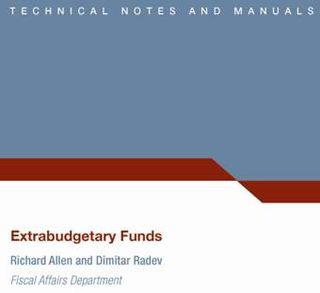Posted by Dimitar Radev

The increasing fiscal challenges in the aftermath of the crisis require a renewed focus on extrabudgetary funds (EBFs) that represent a significant part of central government expenditures. The purpose of the recently issued note on EBFs, as part of the IMF’s Technical Notes and Manuals series, is to address this requirement. The ), in which FAD staff analyzed the status of, and policy regarding, EBFs.[1] The note is substantially reorganized in comparison with the original paper and includes updated information to reflect recent developments.
The note addresses the following main questions:
· What are the definition, classification, and typology of EBFs?
· Why do EBFs exist?
· What are the problems created by EBFs?
· What are the criteria for evaluating and reforming EBFs? and
· What are the implications for analysis of fiscal policies and for public financial management (PFM)?
The note recommends a strengthened policy approach toward managing EBFs that should include the following elements:
· The data on EBFs should be consolidated with the budget figures for the purposes of fiscal analyses and the presentation of information in fiscal reports. Advice for fiscal surveillance should also stress the need to identify and address the political economy factors and budgetary failures that lead to the creation of many EBFs.
· Information on EBFs should be included in the budget documentation, and common requirements should be established for the classification of expenditure and revenue, accounting, internal control, and internal and external audit and reporting, using either the budget system itself or comparable parallel procedures.
· The approach to EBFs should distinguish between the need, first, for the central authorities to exercise tight control of the EBFs’ budget preparation and execution, and for the financial reporting of EBFs to be timely, transparent and subject to rigorous procedures of oversight and auditing; and second, for the EBFs to be given authority to establish their own internal governance arrangements, as appropriate, and manage their business planning and operations in accordance with decisions taken by their senior managers, subject to being held accountable for their organizational performance and results.
· Strong gate-keeping mechanisms, political as well as technical should be established to reduce the probability that unjustified EBFs will slip under the radar and eventually damage the integrity of the budgeting system. Governments should be encouraged to: (i) develop and promulgate an agreed policy position on the minimum requirements for EBFs based upon the criteria discussed in the note; and (ii) carry out a systematic review of their EBFs with a view to reducing the number of funds to the minimum necessary to achieve essential policy objectives.
· Finally, greater emphasis should be given to addressing the specific areas of budgetary failure discussed in the note. These include issues that are already covered in many programs and technical assistance work (e.g., the development of medium-term expenditure frameworks, improving the quality of fiscal data, and strengthening financial management information systems). However, there are other areas that are equally important but less frequently addressed: for example, measures to promote the independence of external audit and strengthen the role of the legislature in the budget process and to decentralize the budget process to improve accountability.
The note suggests that policy advice provided by the IMF, the World Bank, and others needs to clearly distinguish between EBFs with a strong economic and governance rationale and those that are created to reduce transparency, bypass public scrutiny and hamper fiscal discipline. While the agency model—sometimes on-budget, other times off-budget—has been developed successfully in some OECD countries to encourage a better allocation of public resources, this is not recommended practice for developing and some transition countries that do not have sufficiently strong governance and financial management systems to sustain such an approach.
--------------------------------------------------------------------------------
[1] On the same subject, see also the 2006 IMF Working Paper 06/286 authored by Richard Allen and Dimitar Radev, Managing and Controlling Extrabudgetary Funds.
Note: The posts on the IMF PFM Blog should not be reported as representing the views of the IMF. The views expressed are those of the authors and do not necessarily represent those of the IMF or IMF policy.





